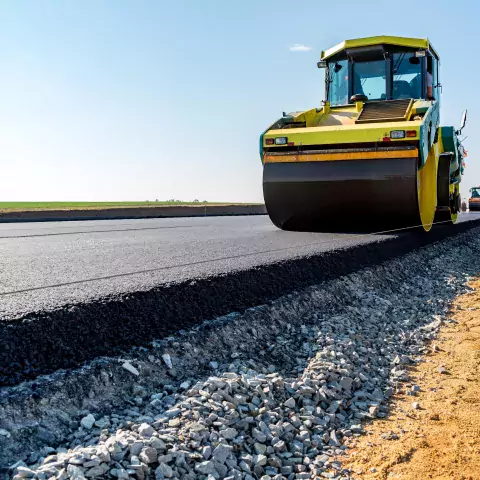
Lime, also known as quicklime, improves the workability and the mechanical performance of soils used for railways, roads, highways, hydraulic works, airports, and industrial platforms. Hydrated lime contributes to the durability of asphalt structures, such as roads, highways, and walkways.
In the presence of water, quicklime spontaneously hydrates to form calcium hydroxide. The heat released during this reaction rapidly dries out damp soil. Lime, known also as quicklime, also dissolves the clayey particles in the soil into their component parts, silica and alumina that, through a pozzolanic reaction with the calcium provided by the lime, form cementitious compounds.
Lime valorizes and speeds up the reaction of pozzolanic materials such as fly ash, cement, and slag. Hydraulic road binders composed of a significant amount of quicklime are used for a wide range of soils as they offer greater flexibility in terms of soil quality. They combine the drying effect of lime on natural soil with the hydraulic reaction of the pozzolanic materials.
Hydraulic binders in which lime is incorporated are used to improve the performance of soils for bases, sub-bases and capping layers, as well as earthworks, in road, railway, airport and other types of infrastructure.
Earthwork activities, trench cutting, and roadwork excavations produce spoil or aggregates that are often dumped. Environmental regulations and cost pressures seek to limit this landfill disposal and the associated heavy truck traffic.
Lhoist has developed solutions to enable the reuse of excavated soil on site by making it suitable for backfilling or road construction.
Dry process
At Lhoist, we have developed a solution that enables on-site upgrading of excavated soil. It consists of a dry treatment process that involves the mixing of dosed quantities of our products (usually 0.5% to 3% by dry weight of soil) to render the resulting material suitable for conventional backfilling and compaction. Lhoist has proven logistic arrangements for just-in-time deliveries. We can also recommend the best mechanical equipment for soil treatment (mobile units and fixed installations) for specific applications.
Lime improves unsuitable and heterogeneous by-products from excavation, allowing their reuse in backfill trenches or in other urban excavations. This process can be implemented in situ, close to the site, or in a central plant thereby increasing resource efficiency.
To optimize the use of quicklime and facilitate recycling, a proprietary on-site system developed by Lhoist allows lime to be dosed directly from big bags/super sacks into a screening bucket.
Our products improve the quality of aggregates, through a dry technique rather than a washing operation.
Some aggregates from quarries and/or recycling are difficult to process in the crusher/screener due to their extremely sticky clay content. As a result, they are removed at the primary crushing stage. Such clay-clogged materials are even more difficult to process in wet conditions.
Improved-quality aggregates are more valuable in the market, generating a higher yield of commercialized quarry output. Our products can be delivered in bulk or in big bags/super sacks.
Suitable mixing equipment can be installed to complete existing quarry primary crusher/screener processing units (fixed or mobile).
Our products are simply side-conveyed to the mixer, after which the mix rejoins the usual process route. Together with external partners, we have developed different types of mixing equipment to treat, recycle, and upgrade difficult materials. The lime-enriched parts of these materials, after screening aggregates, are an ideal filling material with excellent mechanical compaction properties.
In tunnel construction, hydrated lime improves the rheology of mortars, reducing the amount of expensive organic additives required and lowering the cost of grout formulations. Hydrated lime can also be used in the production of binders for injection.
Dredging sludges
Quicklime dries out the drilling muds that are used during the excavation process, making handling easier. It improves soft soils, reduces settling, and increases stability. Synergies between clay and lime provide many opportunities for recycling.
Our quicklime-based products for hydraulic works, such as dikes and dams, are very effective in improving the erosion resistance of soils without affecting their permeability. The enhanced workability and mechanical stability of wet and clayey treated soils help to reduce financial and environmental costs.
In many of our quarries, large stone sizes are produced for decoration purpose. In hydraulic engineering, this type of stone is used to control riverbank erosion and reduce drainage from lakes.
Lhoist is always looking for new long-lasting and economical techniques to build roads and walkways. We have a range of products for hot and cold mixed asphalts, that can be used for road construction and maintenance.
Tailor-made mixtures with fillers are also available. They require no modification of the dosing installation at the customer site. These mixtures improve asphalt quality in terms of resistance to water stripping, frost-thaw cycles, de-icing salts, age-hardening, and rutting.
According to feedback from infrastructure owners, hydrated lime added to asphalt mixtures has been proven to increase pavement durability by 25% or more.
Tack coat protection
Lhoist has also developed a liquid solution to prevent tack coats from being damaged during road construction.
Tack coat integrity needs to be preserved to:
- ensure the durability of the road structure. Lack of adhesion between asphalt layers has been proven to reduce durability by a factor of five.
- keep the area around the job site clean, leaving construction equipment and neighboring road markings free from bitumen marks.
Many studies by road authorities have demonstrated the beneficial impacts that our products have on the adhesive bond between road structure layers.